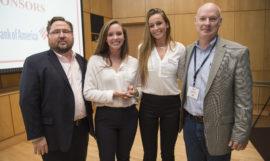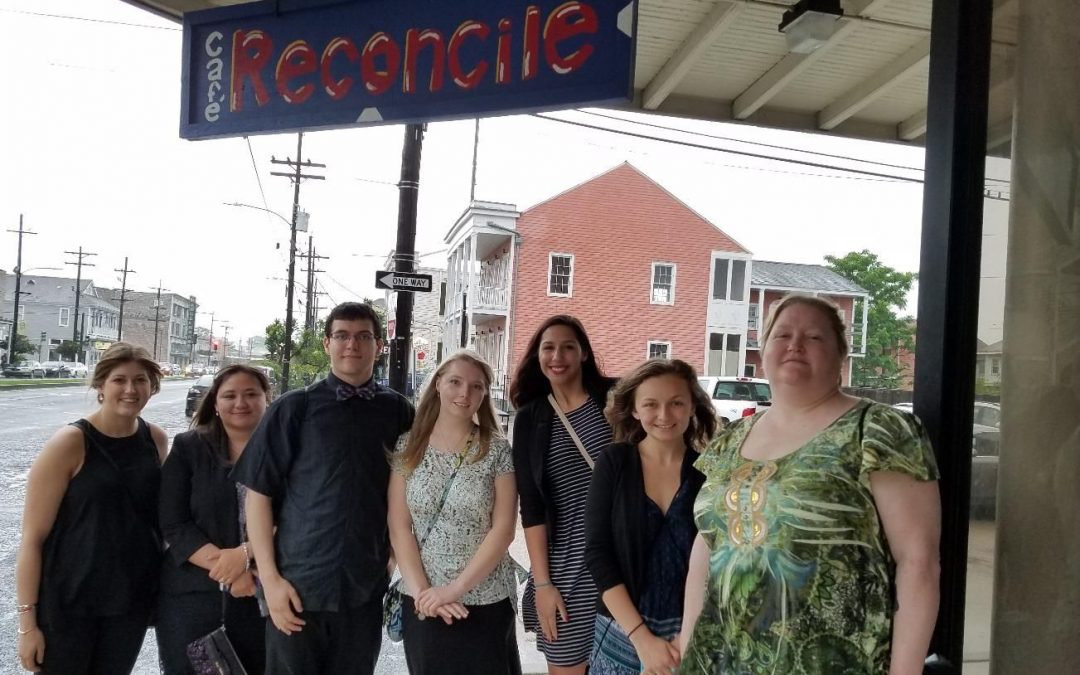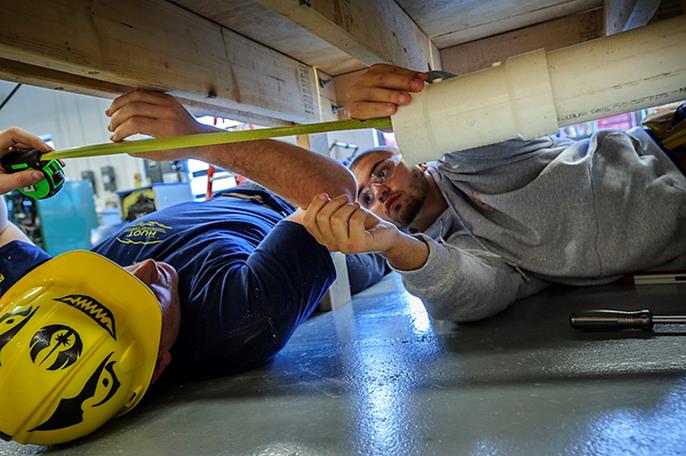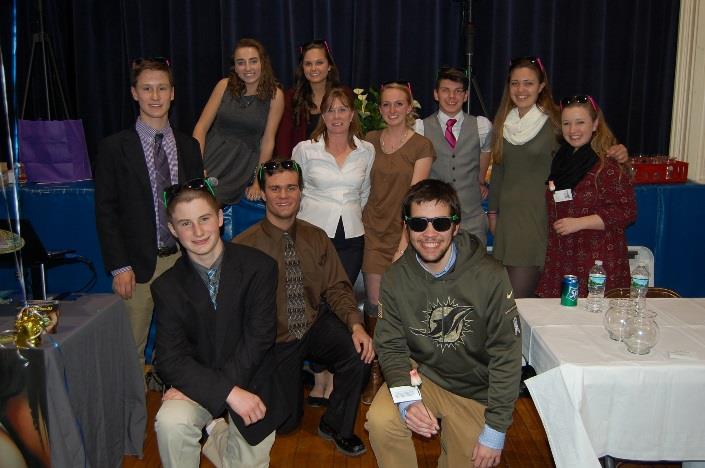
Jun 26, 2016 | Article, Business
Organized by BizGen, whose mission “is to light the spark in the next generation of business developers,” BizGen is a business competition hosted at UNH designed to inspire students to think like an entrepreneur.
Noting it is still in its infancy stage as a competition, Tiffany D’Amour, Business Educator at Portsmouth High School, referred to this year’s BizGen as “stellar.” “Judges were critical and treated the students as if they were true entrepreneurs,” she said. “These judges were comprised of business professionals and angel investors, who are similar to venture capitalists.”
At this year’s competition in late May, Portsmouth High School teams placed 3rd and 4th with prize money for the students of $1,000 and $500 in total, respectively. Awards were provided to the top 4 business ventures out of 18 teams who entered.
D’Amour praised both teams for their hard work, which began with creating and submitting a 1-page abstract that highlighted their business idea, critical areas needed for success, and the target market. The teams then wrote a 10-page business outline and provided a business presentation pitch to a panel of judges.
The 3rd place team, BookBit, was a business venture whose goal was to capture 65% of college students who do not purchase college textbooks. BookBit provided a digital textbook where students could purchase pages of a textbook versus having to make a large upfront payment for the entire textbook.
The 4th place team, Just in Case, was a business venture based on improving the response time of local police to sexual assault or domestic abuse victims. The company offered a cell phone case where the user could slide and click on a button on the side of the cell phone case that immediately configured his/her GPS location and then directly connect with local law enforcement.

05262016_BizGen_2016
“There is no prototype as of right now for either business, but the students learn the entrepreneurial process with this idea,” D’Amour said.
In Portsmouth, she said BizGen has also garnered interest from outside the Business CTE program.
“For the last 2 years, there has been a team that competed and they were hockey players who met before practice to compete,” she added.
Aside from the value of the experience in the competition itself, D’Amour said she believes students gain skills for the long, term, too. “They learn confidence, speaking skills, thinking on their feet, how to keep calm in a high pressure environment and how to network—all critical skills in the business world and life,” she said.
Katie Auger, who was on the 4th place winner and plans to attend UNH Paul College in the fall, said her BizGen experience was unique, as it helped her “learn about myself and discover another part of the business world.”
“It pushes students to discover interests and talents they never knew they had as well as test their creativity,” she said. “It was an incredible event that challenges students to think outside the box.”
D’Amour also expressed enthusiasm regarding the future of BizGen.
“Ken Johnson, one of the founders, works at F.I.R.S.T, which is a robotics STEM company and he believes in the hands-on approach of teaching and inspiring students to be creative in the classroom,” she said. “It is a local competition with a goal to expand nationally.
To learn more about BizGen as an organization and its various initiatives, visit Biz-Gen.org.

Jun 26, 2016 | Article, Hospitality
Seven students from the Great Bay Community College Hospitality Club recently returned from New Orleans where they spent time with students and staff at Café Reconcile, a nonprofit restaurant and event center that helps at risk youth.
Open for business since 2000, Café Reconcile teaches life skills to young people (ages 16 t0 22) from severely at risk communities through a job training program in the hospitality industry. Proceeds from events held at the cafe go directly towards funding the facility, equipment, staffing and food making the venue free for any at risk youth who participates.
Participating student and Club President Kait Short said the trip to New Orleans provided her and other students with a unique opportunity.
“Especially in light of current events, the opportunity we had to exchange stories and experiences with Café Reconcile’s students and staff also helped us feel connected to otherwise distant issues,” she said. “The way that they are working to overcome such adversity is incredibly inspiring, and we took that determination and desire for change back to NH with us.”
Describing the trip as “funfilled and busy” ferry rides on the Mississippi River, long strolls on Bourbon Street and a muddy side trip to Jazzfest, Club Secretary Laura Johnson echoed Short’s sentiments. “The highlight of the trip by far was meeting the students and staff at Café Reconcile,” she said.

The experience also provided students with a real world experience with practical benefits. Club Treasurer Katti Mowers said she learned a lot planning the trip, as she noted she worked with a limited budget and overcame challenging logistics. “This was a great learning experience, because I was able to hurdle all of the obstacle, as I would need to in my future as an event planner,” she added.
Short agreed and added, “The process of organizing the trip to New Orleans gave me a unique learning experience that I can apply in my future career as an event coordinator of community or corporate events.”
In reflecting on her two years in the Hospitality Management program itself, Short said it has helped to open doors she does not think would have been possible at a four-year university.
“As a 25 year old student working fulltime, I need a flexible schedule,” she said. “Great Bay has allowed me to earn my degree and real-life industry experience without putting my life on hold.”

Dawn Comito, Great Bay’s Hospitality Management Department Chair and Club Advisor, applauded club members, who volunteered more than 700 hours in the community over an entire year, including assisting the United Way and Strawbery Banke, to fund the trip. In previous years, they have attended professional conferences in Miami, Chicago and Las Vegas.
“In addition to fundraising, the trip would not have been possible however without the many hospitality business and education partners who acted as sponsors, including Portsmouth Brewery, Atlantic Hospitality Group and The Portsmouth Spa,” she said. “The students are very grateful.”
Participating students included Kait Short, Dover; Laura Johnson, Derry; Jessie LaFleur, Candia; Matt Joyal, Farmington; Amanda Doyle, Barrington; Michelle Zannini, Berwick, Maine; and Katti Mowers, Epping.
About the Hospitality Management Program
Great Bay Community College currently offers an Associate in Science Degree in Hospitality Management offering students two concentration options to choose from. The Hospitality Management – Direct Career option is recommended for students who plan to begin their career immediately after graduation from Great Bay. The Hospitality Management University Transfer option, developed in consultation with the Hospitality Management Department at the Peter T. Paul College of Business and Economics at the University of New Hampshire, is specifically designed to prepare students for transfer to a Bachelor of Science in Hospitality Management at a four-year college or university.

Jun 6, 2016 | Article
This past June, thousands of New Hampshire students walked across the stage to receive their high school diploma, which included 150 graduating seniors who attended J. Oliva Huot Career and Technical Center for two years. While the Huot Center does not technically hand out diplomas, the center does take great pride in the graduation plans of its seniors.
“Students in New Hampshire’s Career and Technical Education (CTE) centers are leaving high school more prepared for both college and their future careers,” said Huot Director Dave Warrender. The Huot Center, located in Laconia, is one of over twenty CTE centers operating in the state that offer cutting edge training to high school students.
One method for improving a student’s post-secondary options is the awarding of post-secondary credit while still in high school. The Huot Center currently has dual-enrollment and articulation agreements with several schools, including New England College, Plymouth State University and Central Maine Community College. The center’s largest partnership, however, is with the Community College System of New Hampshire through Project Running Start, which has enabled students to earn hundreds of transferable credits from schools within the CCSNH system.
In 2015, 74 Huot students will enter post-secondary education, 43 of whom will work and attend school at the same time. All together, the Huot class of 2015 earned 221 college credits through the Running Start program at Lakes Region Community College, which saved their families $41,000 in tuition. This year’s Huot graduates also included thirty-eight students secured full- time employment.
Career and Technical Centers Redefined
According to Warrender, CTE Centers have gone through a significant transformation over the past thirty years. “In the 70’s and 80’s, CTE Centers were often defined by ‘who’ they taught,” he said. “The ‘voc’ was thought of as a place for kids who didn’t fit in an academic setting and were not worried about getting ready for college.”
During the computer revolution of the early 90’s, however, he said the vocational center transitioned into the technical center.
“Our focused shifted from who we taught to what we taught,” Warrender added. “Technical centers became the places where students explored programs too specific or too expensive to be replicated at every high school, while schools realized there was a cost-savings to running technology heavy courses in one centralized region.”
Through a consistent focus on technology, job readiness and applied learning, he said CTE Centers developed unique ways of teaching students in full recognition that a high school diploma was not enough for many high tech careers. Today, he said CTE Centers are now defined neither by what or whom they teach, but rather by how they teach.
“CTE centers in our state do a fantastic job of blending applied technical learning with soft skill development and college readiness standards,” he noted. “Students are expected to leave not only ready to get an entry level job, but to also pursue post-secondary education.”
From the Students
When asked how the Huot helped them to become college-and-career ready, students replied with a variety of answers. “The Huot helps you achieve so much more than you would ever imagine,” said Bridgette Robichaud of Franklin, an Allied Health student, who has enrolled in the Dental Assistant Program at New Hampshire Technical Institute.
“My teachers taught me new skills and I reached many great accomplishments,” added Liam Gove, who entered the automotive program from Winnisquam Regional High School and secured a position as a boat technician at Winnisquam Marina. “More importantly, the class taught me how to cope with failure.”
Gove’s sentiments were echoed by Joe Judkins, another Winnisquam student that attended the Building Construction program and one of 10 who has opted to pursue a career in the armed services. “The Building Class taught me many professional and personal skills—this built my self-confidence and ability to decide to join the military,” he said.
For five years running, the Huot Center has achieved a 100% pass-rate on the state exam for Licensed Nurse Assistants. One of this year’s candidates, Nicole Rosas of Belmont, could not be more pleased with her experience. “The program and my required 60 plus clinical hours helped me decide what I wanted to do after graduation,” she said. “My teachers gave me great support and were always encouraging.” Nicole is enrolled in Arizona State University’s Nursing Program and plans on working as a Licensed Nursing Assistant while attending school.
The ability to earn college credits has also been an important consideration for students, as is evidenced by Mikayla Bordeau from the Huot’s Careers in Education program. She earned 14 college credits while in high school, including 11 from her class the at career center. She also secured a position with Lakes Region Child Care Services, Inc. and has enrolled in the Elementary Education program at Plymouth State University.
While the majority of Huot students transition directly into a related field, Dacey Lecuyer, a Culinary Arts student, is taking the teamwork and customer service skills she learned in a different direction. “The program has taught me self-discipline and gave me confidence to be prepared for cosmetology school,” said Lecuyer, who has enrolled at Empire Beauty School in Laconia.
Striving for Real World Standards
At the start of the year assembly, Warrender will pose the students with a few simple questions: Who wants to eat chicken cooked by a C- chef? Who wants to bring their car to the mechanic who puts on 70% of their lug-nuts or go to the nurse who gives you the right medication 7 times out of 10?
“At the Huot—like at all CTE centers—students are taught to keep doing a task until they can do it right,” said Warrender. “The experience of performing a task for an actual customer in many cases carries a weight that engages students and pushes them to not just ‘pass a class,’ but truly strive for excellence.”
He said students who work hard, master skills and go above and beyond earn a reward beyond a grade or credit. “They earn the recommendation of their CTE teacher, a person who has real-world experience working in the career path to which these students aspire,” he added. “This is the key ingredient that helped so many of our graduates land jobs this year.”
There is not just one kind of student that has come to value career and technical education, either, as Warrender said many of the school’s top academic student take CTE classes. During the 2014-2015 school year, the Huot Center inducted 27 students into their local chapter of National Technical Honor Society and handed out a record number of academic and career scholarships to their graduating seniors.
“This year, four of Laconia High Schools top ten students had taken courses at the Huot Center, including both the class salutatorian and valedictorian,” he said. “Huot students are also eligible to earn both honors credit and NH Scholars Recognition for many of their career center course.”
As for the Huot’s Center future, Warrender said it looks bright, while citing an anticipated overall enrollment of about 460-470 students in the fall. “We are seeing a real increase in both student, community and business interest not just here but across the state,” he said. “I think everyone recognizes the time for Career and Technical Education is now.”

Jun 6, 2016 | Article
When NASA calls and offers your students an opportunity of a lifetime, you do not pass it up, which sums up the experience of teacher Andy Shaw at Mount Washington Valley Career & Technical Center. In this case, however, it was an email as opposed to a phone call.
“I opened up my email one day, and it said, “Do you and your students want to make parts for NASA?” he said. “I could hardly believe it.”
According to Shaw, the communication resulted from MWV Career & Technical Center’s placement in a Skills USA Precision Machining Competition in which they placed 17th in the nation. Readily accepting their offer, Shaw said his students experienced “substantial success” in the year that followed manufacturing pre-designed parts.
In recent months, however, the bar was raised significantly. As Shaw noted, the MWV Career & Technical Center was approached by NASA to become a Design to Prototype school. At this level of collaboration, students work to develop solutions to problems brought back by astronauts from the International Space Station.
One of only 40 schools in the nation certified to handle material for NASA, Shaw said such a designation has provided students opportunities few ever realize. In late September, NASA and the Goddard Space Flight Center sent people to the Career and Tech Center to talk with students about their collaboration to build parts for the space program.
“The students got to work alongside people from NASA for about 8 hours,” he said. “They made a demo while they were here—it was an incredible experience.”
For Shaw, the best part of the entire experience for him has been how students in the Machine Tool Program have reacted to the increase in responsibility. In his own words, “Students are taking off.”
“Just the look on their faces was priceless when NASA was here,” he said. “You can see kids opening up.”
As for how such opportunities are possible with NASA, Shaw cited High Schools United with NASA to Create Hardware (HUNCH), an instructional partnership that began with high schools and intermediate/middle schools. Within this partnership, NASA receives cost-effective hardware, while students receive real-world hands-on experiences. Additionally, NASA provides materials, equipment and the mentoring required to fabricate the items as well as quality inspection oversight during their fabrication.

“It’s an incredible opportunity for our program and especially for these kids,” said Shaw, who noted his students also raised money to visit the Goddard Space Flight Center in Maryland. “The whole experience has been incredible.”
The focus for students now, however, is their next project, which they have already begun.
“It’s a mechanical pencil for the International Space Station,” he said. “The students and I couldn’t be happier about the project.”
To learn more about NASA Hunch, visit www.NasaHunch.com.
To learn more about MWV Career & Technical Center, visit www.MWVCTC.com.
Jun 6, 2016 | Article
There are many ways teachers and administrators at NH’s Career and Technical Centers help students make connections. At the Seacoast School of Technology (SST), “making connections” begins by teachers building relationships with middle-schoolers through Technology Fun Nights and SST Summer Camps.
At Technology Fun Nights, which run throughout the school year, students participate in events designed to get them excited about the fast-changing world of technology. Topics include everything from basic computer programming and animation to digital design, pre-engineering and more. In December, students will learn about the science, mathematics, engineering, and problem solving found in computer games.

According to Principal Margaret Callahan, these nights literally “sell out” in a matter of hours. “I have parents calling me the day after the last Technology Fun Night to sign up for the next one,” she said. “We have a waiting list of two pages and stop it there.”
Since starting these Technology Fun Nights in 2003, more than 3,500 students from the 5th through 9th grade have attended them. In helping students make connections to the larger community in which they live, they are also asked to bring a voluntary donation of three cans of food per person to donate to a local food bank.
At SST Summer Camps, which have taken place for the past six summers, Callahan said more than 700 students have participated in 15 different career camps. Programs offered this past summer included computer programming, an introduction to culinary arts, automotive engine basics, how to care for animals, and more.
“The summer camps sell out, too,” she said.” People have already started calling and parents line up with checks in hand the day registration opens.”
Morgan Leet ’16, Culinary Arts, Exeter High School, said her experience in SST’s Culinary Arts summer camp helped her find her passion. “Not only did I have a great time, but this experience really helped me decide that Culinary Arts is the path I want to take in my future,” she said. “I learned a lot in the kitchen and I was motivated to practice my skills at home and apply my knowledge.”
Leet’s involvement in SST’s programming did not stop there, however. “After attending the summer camp, I got involved in the SST mentor program and was able to learn even more about what is involved in the profession,” she said. “I also attended two of the SST Chef’s Table nights. Now that I am finally here as a student, I am ready to learn all that I can and I am very excited for a great year.”
Callahan credited “the vision and talents of [their] dedicated teachers” as instrumental toward helping students like Leet. “Many of our current students came to SST once upon a time as middle school students with only a vague idea of their future plans,” she said. “Today, their goals are more focused… We have a great school with generous teachers who offer great things to students of all ages.”
In looking ahead, Callahan said they look forward to expanding their programs as much as possible.
“We are teaching the skills people need to get jobs,” she added. “These programs are relevant and the payback is huge.”
To learn more, visit SeaCoastTech.com.

May 27, 2016 | Article
In April, the Seacoast School of Technology (SST) in Exeter held its 10th Annual Small Business Showcase, which has grown from 20 participating businesses in its first year to 80 businesses and more than 300 attendees.
According to Sandra Flannigan, SST Marketing Technologies Instructor, the purpose behind the showcase is for Marketing Technologies II students to use the skills they learn during their two years in class in a real-life scenario. She said another objective is to work with the Exeter Area Chamber of Commerce and Hampton Area Chamber of Commerce to bring businesses together from the Seacoast area and participate in business to business and business to customer marketing.
“Students start planning the event in December as their capstone project for Marketing Technologies II,” she said. “They use materials from previous years and work together as a group to make decisions on how they will run it this year. They are responsible for every aspect of the event. Students make many phone calls to get businesses to commit to attending, advertise for the event and they must solicit for door prizes as well.”
In planning the event, she said students break into four separate groups: Sponsorship, Logistics, Promotions and Marketing, and Exhibitor Relations. “They plan the menu and work with our Culinary Arts program to provide hors d’oeuvres,” she added. “They also needed to make sure the room is set-up perfectly and that everything runs smoothly.”
Flannigan said the best part about the event is that students actually plan and execute it, as she acknowledged she only works as an advisor if they have any questions. “They are free to change the event year to year so that it will be successful with their own spin on it,” she said. “Students learn how to work with others, gain leadership skills and experience all the details that go into planning a successful event.”










